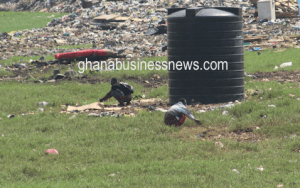Some 19% of Ghanaians defecate in the open – Minister
 Madam Cecilia Abena Dapaah, the Minister of Sanitation and Water Resources, said 19 per cent of Ghanaians defecate in the open and 35 per cent of urban dwellers patronise public toilets.
Madam Cecilia Abena Dapaah, the Minister of Sanitation and Water Resources, said 19 per cent of Ghanaians defecate in the open and 35 per cent of urban dwellers patronise public toilets.
She said it was sad to note that only 15 per cent of Ghanaians had access to improved toilets, which had just increased by nine percentage points in the last 25 years.
Madam Dapaah said this in a speech read on her behalf at the Commemoration of the 2018 World Toilet Day at James Town in Accra on Monday. It was on the theme: “When Nature Calls.”
“As a people, our lives revolve around toilets directly and indirectly and we have to take issues of toilets seriously. Sanitation has a number of good benefits but lacks the needed glamour to ensure everyone living and working in Ghana has access,” she said.
According to the World Health Organisation, indirect effects of malnutrition, to which poor water and sanitation contributes 50 per cent, costs even more than the direct effects, taking the total health cost to 5.2 per cent of annual Gross Domestic Product (GDP) in Ghana.
The figure includes the value of at least 8,000 deaths of children under-five years caused by diarrheal diseases.
The World Bank country environmental analysis conducted in Ghana showed that health costs resulting from poor water, sanitation and hygiene in Ghana is equivalent to 2.1 per cent of annual GDP and Ghana loses GH¢1.4 billion annually due to poor sanitation.
“These effects are too huge and frightening and we need to do something about it as a people,” Madam Dapaah said.
She disclosed that as part of the Ministry’s measures to control open defecation and general sanitation problems, it had launched a ‘Sanitation Technology Competition dubbed ‘Sanitation
Hackathon’ to leverage technology to address sanitation challenges in the country.
The Hackathon had assembled computer programmers and sanitation experts to develop innovative digital solutions to accelerate improvement in solid waste collection; build sustainable systems for recycling and provision of dislodging services.
Nii Adjei Sowah, the Chief Executive of the Accra Metropolitan Assembly, in his welcome address, said even though toilet facilities had been established along the beaches, the public still resorted to open defecation, adding; “that has become a culture that needs substantial attention.”
He said Ghana, in 2012/13, was tagged the seventh dirtiest country in the world because of her inability to manage open defecation.
In 2015, he said 20,000 cases of cholera were recorded out of which 200 affected individuals died, and attributed all to problems of open defecation and poor sanitation.
The AMA Chief Executive, therefore, called on the public to collaborate with the Government in its step to construct toilets facilities for all households within the country.
He said the AMA would pay 70 per cent of the total cost and allow the households to pay 30 per cent as a measure to reducing cases of open defecation and its consequences on health and the economy.
Dr DorisYaa Dartey, a Member of the National Media Commission, who chaired the event, said open defecation was disgraceful to the country and showed that Ghana had not understood the meaning of independence.
“It’s unpardonable that we have kitchens in our homes to cook and eat and don’t have toilet facilities. When we are to respond to nature’s call, then we start having panic attacks and just find anywhere in the bushes and beaches to ease ourselves,” she said.
She urged all schools and offices to build toilet facilities for students, staff and clients, and advised the public to desist from defecating in black polythene bags and disposing them off indiscriminately.
Source: GNA
